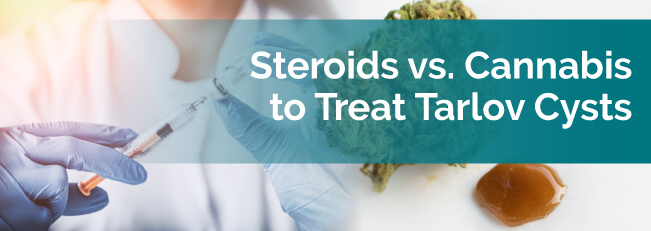
Many patients dealing with Tarlov cysts in their spine receive corticosteroid treatment. Since Tarlov cysts cause pain and inflammation, doctors prescribe corticosteroids that calm down the inflamed areas.
However, corticosteroids are potent drugs that can cause severe risks. Not everyone can take corticosteroids, and other pain-controlling medications don’t always provide enough relief.
So, some folks with Tarlov cysts and other issues related to inflammation in the spinal cord try medical marijuana. Cannabis can’t cause severe harm that corticosteroids can while providing a similar level of relief.
Approximately 5% of adults in America have Tarlov cysts, which appear in the lower spine and tailbone for unknown causes. The cysts fill up with spinal fluid, putting pressure on the spinal nerves and potentially causing long-term issues.
Some folks with Tarlov cysts have cysts so small they don’t even notice them, while others have larger cysts that cause extreme discomfort. In severe cases, doctors may recommend surgery to try to remove the cysts.
Tarlov cyst symptoms range from mild to severe and relate to the nerves pressed on. They can cause abdominal pain, trouble walking, sexual problems, incontinence and more. Regardless of the other symptoms, they almost always cause pain when they become severe enough.
The nerves affected by Tarlov cysts can become inflamed, causing nerve pain and discomfort. To reduce the inflammation, some patients receive corticosteroids.
Corticosteroids are medications that imitate the cortisone hormones that your body makes. They don’t usually cause many problems when someone takes them to replenish low cortisone levels. However, when you already have enough cortisone hormones, they can create some serious risks.
Since most Tarlov cyst patients use corticosteroids for inflammation instead of a hormone deficiency, they often deal with the medication’s side effects. Milder side effects include appetite problems, restlessness, indigestion, dizziness, and increased sweating. In some cases, patients can experience vision problems, mood issues, confusion, and hallucinations.
Patients who take corticosteroids also have a suppressed immune response. This means that they have a higher chance of getting infections and illnesses. It also prevents them from using medicine like mental illness medication, ibuprofen and more.
The most well-known use of medical marijuana is pain relief, but did you know it also handles inflammation? When appropriately used by a patient who reacts well, it can serve the purpose of corticosteroids with more benefits and fewer risks.
To give you health benefits, cannabis interacts with a system in your body meant specifically for cannabinoids. Cannabinoids, or the components in marijuana, communicate with your endocannabinoid system to affect your brain and immune system.
As part of the endocannabinoid system, your cells have cannabinoid receptors that take in cannabinoids. There are two types of cannabinoid receptors — the CB1 receptor and the CB2 receptor. While the CB1 receptor affects your cognitive functions, the CB2 receptor influences your immune system.
When cannabinoids activate your CB2 receptors, your immune system sends less inflammatory signals. Inflammation usually serves to separate dangerous substances from your body as an essential immune response. But, in cases like Tarlov cysts where you have too much inflammation, we can use cannabis to reduce cytokines, substances that send inflammatory signals.
While we provide all the up-to-date information you need about medical marijuana, we can’t speak to your specific circumstances. Before making an important medical decision like making the switch to cannabis medicine, you should get in touch with an educated and licensed physician who knows their stuff.
Your best bet is to visit a doctor who regularly recommends medical marijuana. Once you have a cannabis recommendation, you can also visit a local dispensary and ask the staff about marijuana medication.
For more information about how cannabis can be used to treat Tarlov Cysts, check out our resources: